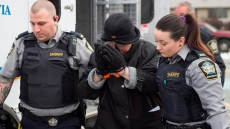OTTAWA — Almost 300 Canadians were nominated to become the first senators appointed under Prime Minister Justin Trudeau's new process aimed at turning the Senate into a less partisan, more independent chamber of sober second thought.
Trudeau named seven new senators last month, all chosen from a short list of 25 recommended by a newly created, arm's length advisory board.
In its first report on the fledgling process, the board says it received 284 nominations from a host of groups representing a broad cross section of Canada's diverse population. The board itself directly contacted 400 groups, from academic, labour and business organizations to groups representing indigenous peoples, women, linguistic, ethnic and other minority populations.
The nominees were 49 per cent female, 51 per cent male; 10 per cent identified themselves as indigenous, 16 per cent as visible minorities and four per cent as disabled, the report says.
The board's first batch of recommendations were intended to fill five vacancies: one in Quebec, two in Ontario and two in Manitoba. However, Trudeau ultimately decided to fill two additional empty slots, one more in Quebec and one more in Ontario.
Overall, 72 per cent of the nominees were anglophones but the vast majority of nominees for the open Quebec seats were francophone.
However, the report suggests interest in the new Senate appointment process was lowest in Quebec: just 39 nominations from that province, compared to 51 from Manitoba and 194 from Ontario.
Advisory board chair Huguette Labelle, a former senior federal bureaucrat, said the fact that Quebec is the only province in which senators are required to represent and own $4,000 worth of property in specific electoral divisions "might have been complicating for people."

The board, created in mid-January, was given until Feb. 25 to recommend nominees for the initial five vacancies, she pointed out. That necessarily meant the period in which organizations could nominate candidates had to be short — from Jan. 29 to Feb. 15.
As it proceeds with the next phase of the new process, recommending nominees for the remaining 17 Senate vacancies and any others that may arise, Labelle said: "I think we will have more time — I hope we will have more time — and therefore we'll have a much greater capacity to use the time for promoting, for informing, ensuring that a great part of the population is fully aware."
The first phase required organizations to initiate nominations but individual Canadians will be able to put their own names forward in future. All those who didn't make the cut for the first seven appointments are welcome to apply again.
Controversy has already surfaced with regard to one of Trudeau's first seven Senate picks, veteran Montreal journalist Andre Pratte. At the time his appointment was announced, Pratte did not own the constitutionally required property in his electoral division.
Labelle said she doesn't believe that's a problem, that he only needs to own the property by the time he's officially sworn in, which has not yet occurred.
Nor was she disturbed that Trudeau named seven senators from the list of 25, contrary to the board's mandate to recommend five names for each vacancy.

"The 25 people that we recommended were all very high quality people so I think it's very much a decision of the prime minister to go ahead and appoint the seven," she said. "I don't think that this is an issue, really."
The others appointed by Trudeau are former justice Murray Sinclair, former senior bureaucrat Peter Harder, former Ontario NDP cabinet minister Frances Lankin, Paralympic athlete Chantal Petitclerc, immigrant advocate Ratna Omidvar and former Universite Saint-Boniface president Raymonde Gagne.
All seven will sit as independents, including Harder, although he will also be the government's representative in the Senate, charged with shepherding the government's agenda through the chamber.


